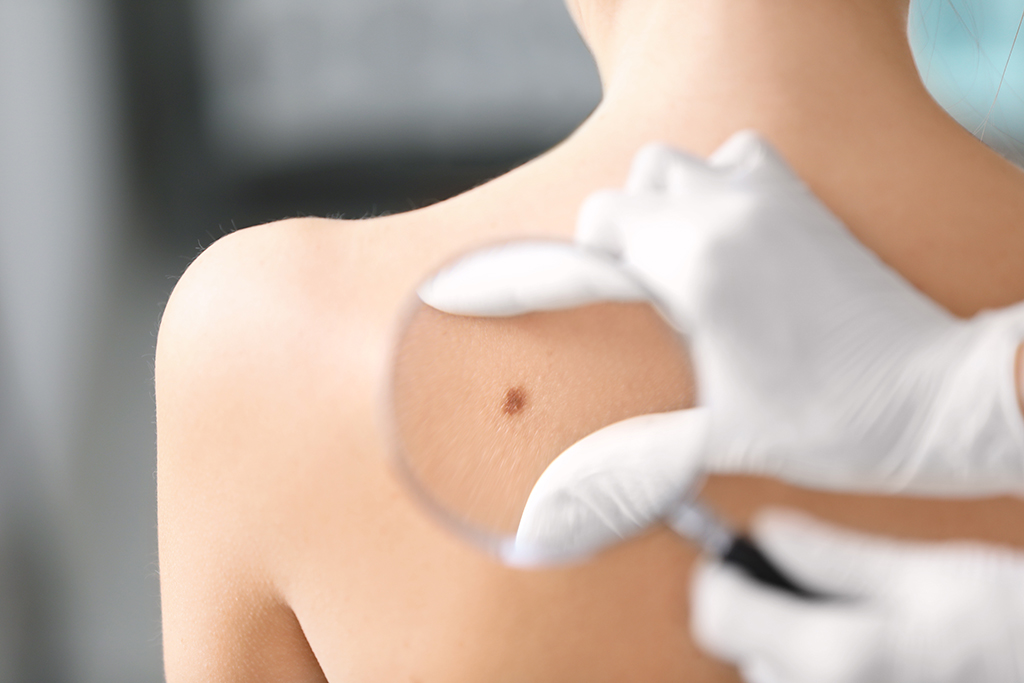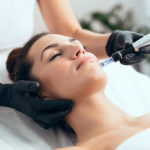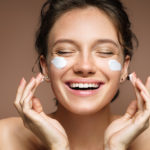
Photo by Africa Studio at Shutterstock
Board-certified dermatologists at Compassion Dermatology treat up to 3,000 distinct diseases, according to the American Academy of Dermatology. These doctors treat not only the skin but your hair and nails as well. These specialists can treat everything from acne to skin cancer to eczema. We’ve included skincare tips from the premier professional association for dermatology in the country.
First, take a moment to understand your skin type:
- Sensitive skin often stings after using products.
- Normal skin is not sensitive and typically clear.
- Dry skin has rough patches and may feel flaky and itchy.
- Oily skin feels greasy and looks shiny.
- Combination skin contains both oily and dry spots.
Now that you have a handle on your skin type, you can learn which products will help your skin heal and stay young and healthy-looking.
Skin Routines Recommended by Dermatologists
If you want healthy skin, wear sunscreen and avoid touching your face. Find out what else you can do for glowing skin that feels smooth to the touch:
- Wear sunscreen outside. This is the most important thing you can do to protect your skin. Apply the sunscreen correctly to prevent harmful ultraviolet rays from damaging your skin. UV rays cause premature aging, sunburn, skin cancer, wrinkles, and other health problems. Choose a water-resistant, broad-spectrum sunscreen. An SPF of 30 or above works best. Apply the sunscreen to all exposed skin, and if you’re swimming or sweating, carry it with you to reapply every couple of hours. Many moisturizers also contain sunscreen, which can save you a step in your beauty routine. You have to reapply the sunscreen several times a day to receive the most consistent protection. No sunscreen blocks out 100% of UV rays. So, if you’re outside a good portion of the day, wear protective clothing and find shade whenever possible to get out of the sun. In warmer weather, a long sleeve, lightweight shirt, and lightweight pants can provide protection without making you break a sweat. Although it’s not a major fashion statement, a broad-band hat partnered with sunglasses can protect your face and eyes from dangerous sunlight. You can also look for clothing that has an ultraviolet protection factor (UPF), which is typically listed on the label.
- Avoid tanning beds. Most dermatologists agree that tanning bins are a bad idea. They contain UV radiation that can lead to skin cancer. According to the AAD, a single trip to the tanning salon can increase your risk of melanoma by 20%. the same exposure can increase your risk of developing squamous cell carcinoma by 67%. Getting your glow on makes you vulnerable to several types of skin cancer. Apply self-tanning lotion evenly and you won’t end up with streaks or orange skin and you can skip the tanning booth for a healthier option.
- Keeping skincare simple. Using too many products such as multiple serums for anti-aging can cause skin irritation. This can increase breakouts and other skin conditions. It’s better to stick to basics such as wearing sunscreen, using a gentle facial cleanser, and nongreasy moisturizer. Once you find a routine that works for you, stick to it.
- Match your products to your skin type. Remember the list of skin types discussed above? Carefully read the labels to find products designed with your skin in mind.
- Protect your lips. Since they are treated as a separate part of the body, it’s easy to forget that your lips are part of your skin. So don’t forget to protect them. There are many lip balms that contain sunscreen to help you avoid skin cancer and conditions that can also affect your lips.
- Keep your hands off your face. Whenever you touch your face, you transfer dirt, germs, and oil from your hands to your face. Do your best to leave your skin alone throughout the day. Avoid picking, popping or squeezing pimples, as this can cause scarring.
- Check your skin regularly. Self-exams are your first defense when it comes to avoiding skin cancer. Did you know that skin cancer is the most common form of cancer in the United States? Approximately 20 people die from melanoma in this country every day. Fortunately, early diagnosis greatly improves your chances of survival. When detected by your doctor at an early stage, up to 98% of melanoma doesn’t spread to lymph nodes. So, check your body regularly and look out for moles that change color, bleed or itch. If you notice anything suspicious or even remotely questionable, make an appointment with an experienced dermatologist in Southlake, TX.
Benefits of Seeing a Dermatologist
Dermatologists can quickly identify and treat hundreds of skin conditions before they get out of control. Whether you need help with your acne or have a suspicious mole, a dermatology specialist can give you the answers you need to take the next steps. Fortunately, most skin conditions are treatable, and knowing what to do will give you peace of mind as well as improve your skin.
Here are some exclusive benefits of visiting the professionals at Compassion Dermatology:
- Their extensive experience. Dermatologists see strange skin conditions every day. While they excel at treating common symptoms such as acne, they can also treat rare conditions other practitioners aren’t familiar with.
- They identify the underlying causes of skin conditions. Some skin conditions derive from poor diet, environmental factors, or genetics. Making an appointment with a dermatologist often gives you a definitive answer on the underlying causes of your skin condition.
- Access to the right medication. While there are numerous skin care products available at the pharmacy, it’s important to get the right dosage to treat your skin condition. For that, you’ll need to visit a dermatology specialist.
Compassion Dermatology in Southlake, TX
From facials and spa-like treatments to getting down to the nitty-gritty of skincare, your doctor can help you keep your scan healthy and looking great. Make an appointment with one of our board-certified dermatologists at compassion dermatology in Southlake, TX, today.


